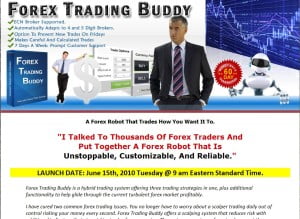 Forex Trading Buddy is a hybrid trading Expert Advisor with three built in Forex robots each trading different strategy.
Forex Trading Buddy is a hybrid trading Expert Advisor with three built in Forex robots each trading different strategy.
It is a hybrid in a sense that it scalps and trades swings at the same time. The scalper part of the system trades daily for small but often profits. The other 2 of its built-in robots look for swings to make more pips in a long term. The EA is developed to run on EURUSD currency pair and doesn’t open new trades on Fridays as a protective measure.
The backtests show a winning rate of about 82% and a drawdown of only 6%. The scaler’s trades have a higher risk as any scalper’s but the swing robot’s trades have a good risk/award ratio (<1) and seem to cover the scalper’s risk well.
Forex Trading Buddy EA is very customizable, well documented and user-friendly. It works with all brokers including ECN and 5 digit brokers.
More details:
- Cost: $147
- Currency pairs supported: EURUSD
- Guarantee: 30-day money back guarantee
I have running in three demos accounts for the past week.
It has opened and closed six trades for a total of 75 pips.
It’s a 50/50 deal. You might as well throw darts…